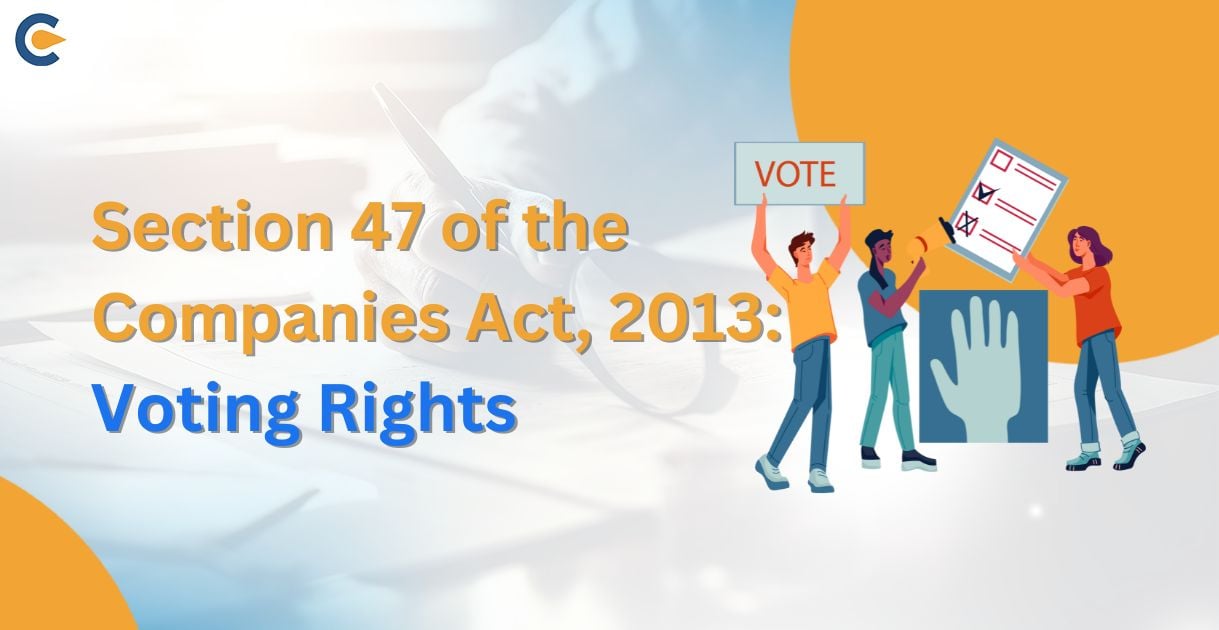The Companies Act, 2013 was established with the intent to bring a reform in the company laws in India. The Companies Act of 1956 was in use for such a long time, with the continuous changes taking place in the corporate world, it was crucial to come up with some new laws which can be implemented in the current period.
The objectives behind the Companies Act, 2013[1] are to encourage business, improve business performance, and make it easier and more flexible to establish and maintain businesses in order to advance economic growth. To meet the demand for compliance standards that is more timely, effective, and pertinent in the current situation. Although there are many smaller amount sections now, the Central Government is nevertheless given the authority to prescribe important features in the form of Rules, highlighting the greater significance of delegated law. India’s corporate laws are governed under the 2013 Companies Act. It defines several rules and regulations for how businesses should operate and be managed etc.
The Company Act of 2013 also discusses the authority of inspectors and the specific procedures they must follow while conducting investigations. Since it preserves the goals and tenets of the 2013 Companies Act, the inspectors’ function is crucial under the Companies Act. In this blog we will discuss Section 217 of Companies Act, which is related to all the powers given to the inspectors during the investigation of the company. This Section also talks about the procedure that is to be followed by the inspectors during the investigation.
Understanding the Essence of Section 217 of Companies Act, 2013
Section 217 of the Companies Act talks about the powers of the inspectors and the procedures that the inspectors must follow at the time of investigation. It is mandatory to submit all the documents and other records when the inspector asks for it in relation to the investigation. It will be the duty of all the agents, employees and officers of the company, current and former both, to assist the inspector in the investigation whenever it is required.
All the documents, books, reports and any records which are handed to the inspector for the investigation purposes must be returned to the employees, agents or the officers within 180 days. The inspector will have the right to question any person he finds suspicious, and if the person is not related to the company, then ask for prior permission from the Central Government. The inspector has the same powers as of the civil court.
Sub-Section (1) of Section 217 of Companies Act, 2013 – Duty of employees, officers and agents of the companies, including the former
Under the sub-section (1) of this act, when the company is under the investigation under the provisions of this particular chapter or under Section 219 of the act for a body corporate, it is mentioned that it the duty of all the officers, agents and employees of the company, including the former agents, employees and officers of the company or the body corporate:-
- retain and provide to an inspector all records and documents belonging to or pertaining to the company or any other legal entity or person under its control;
- To offer the inspector any and all help they are able to in relation to the inquiry.
Sub-Section (2) of Section 217 of Companies Act, 2013
The body corporate or other than a body corporate which are mentioned in the sub-section (1) of the section can be asked by the inspector anytime for documents and information which the inspector finds important for the investigation.
Sub-Section (3) of Section 217 of Companies Act, 2013
The information, books of account, other papers and documents which are held by the inspector for the investigation, shall have to be return by the inspector within 180 days from the day they were taken and should be returned back to the person from whom they have taken or to the company. These documents and books can again be asked for by the inspector, which will start the 180-day cycle from the start again. The order for the same has to be in writing.
Sub-Section (4) of Section 217 of Companies Act, 2013
The inspector has the right to question any person relating to the company that is under investigation. The person has to tell the truth and be on an oath when questions are asked of him in relation to the investigation, and the inspector has the power to do so. Any people who are referred to in sub-section (1) of the act can be called for questioning by the inspector. The inspector also, if necessary, can ask other people the question as well, but for this prior permission from the central government is required. The other people mentioned here can be related to the company or its affairs in some other way or related to the body corporate.
Proviso to Section 217(4)(b) – when the investigation is being carried out under Section 212, prior permission of the Serious Fraud Investigation Office’s director will be required for sub-clause (b).
Power of Inspectors under the Section 217 of Companies Act
The inspector who is carrying out the investigation under this section will have the same powers as of the civil court in the Code of Criminal Procedure, 1908 in the matters:
- The inspector can ask for any documents or books to be produces for the inspection at any place and time
- Any person can be summoned and enforcer for the attendance, where the inspector can question them under the oath
- The documents, or the books or registers can be inspected at any place
This can all be done, even if there are other laws and contracts in presence.
Punishments for Non-Compliance of Section 217 of Companies Act
If the instructions given by the registrar or the inspectors are not obeyed by any officer of the company or any director of the company, this will result in a fine as well as imprisonment. The imprisonment may be extended to a period of 1 year while the fine can be up to ₹25,000 but not less than it, and can extent up to ₹ 1, 00,000.1
On the other hand, if the officer or the director is convicted and is found guilty of violating the laws then in this case the officer or the director will lose their job and position in the company, and they won’t be allowed to work at any other company as well. [Section 217 (6) (ii)]
Sub-Section (7) of Section 217 of Companies Act, 2013
All the notes during the examination should be in writing, and should be signed, and read to the person that is examined, which can then be used as evidence if required.
Sub-Section (8) of Section 217 of Companies Act, 2013
The person when does not co-operate with the inspectors and the investigation and does not have a reasonable cause will be punished, fined and imprisoned. Any individual or company cannot refuse to produce any books of account, or documents which are asked for by the inspector who is not investigating, nor cannot, say, refuse to provide any information. Furnishing the information is the duty of the director or the officer. If they do not meet the inspector when asked, the person cannot refuse to sign the examination notes as well.
If any of the above takes place, then that person is liable for a punishment which may extend to 6 months, and fine of ₹ 25,000, but not less than that and can extend up to ₹1,00,00. When the refusal still continues the fine can be further extended to ₹2000 per day.
Assistance to Inspectors
All the officers of –
- Central Government
- State Government
- Police
- Statutory Authority
Should provide all the assistance that they can to the inspector, during the investigation or inquiry or inspection of the company. For this kind of assistance, a prior approval from the central government is needed.
Sub-Section (10) of Section 217 of Companies Act, 2013
Under this sub-section, if the central government feels so, it can make arrangements foreign states to help and assist in any inquiry, inspection or investigation of the companies under this act
Sub-Section (11) of Section 217 of Companies Act, 2013
This sub-section talks about when during the investigation, inquiry or inspection it is found that some evidence is in a different country, at that time the central government can request the authorities in the foreign state to examine and gather evidence on the behalf and then send it to India.
Investigation, Inquiry and Inspection in Foreign Country
A letter of request for an inspection of a company’s affairs from a court or authority in a nation other than India may be forwarded by the Central Government. The court will issue a summons, take their testimony, or issue papers. Another option is to forward the letter to an inspector for review. Similar to how a firm would be investigated under this Act, the inspector will look into the company’s affairs. If a longer period of time is required for additional action, the inspector has to submit the report within 30 days.
The court shall forward the evidence obtained or items gathered in accordance with the foregoing to the Central Government for transmission in the manner the Central Government may deem appropriate to the court or the authority in the foreign country or location that issued the letter of request, or authenticated copies thereof or the items so obtained.
Conclusion
Section 217 of Companies Act included all the information related to the powers of the inspectors that are appointed by the central government for investigating, inspecting and inquiring about the company and its employees and members. The procedure and the powers which are vested in the inspector for carrying out this inquiry, investigating and inspection are similar to that of a civil court in CrPc. Not complying with these sections can result in fines and imprisonment.
Frequently Asked Questions
The rights and methods of inspectors appointed by the Central Government to conduct investigations into concerns pertaining to companies are covered by Section 217 of the Companies Act, 2013, which is the law in question. Within the corporate sector, it guarantees honesty and compliance.
According to Section 217, any officer chosen by the Central Government may be classified as an inspector. According to the Code of Criminal Procedure (CrPC), they have the same authority as a civil court.
All workers, officials, and agents-including former ones-have a responsibility to hold onto and submit all records and documents relevant to the company during an inquiry. Additionally, they must to assist the inspector as needed.
Yes, if they are necessary for the investigation, an inspector may ask a body corporate or one of the other entities listed in Section 217(1) for documents and information.
The answer is that records and documents held by an inspector during an investigation must be returned within 180 days of their initial date of possession. With a written order, the inspector may re- request them, beginning a new 180-day cycle.
Any anyone connected to the business under investigation may be questioned by an inspector. They must be truthful when sworn in. With prior approval from the Central Government, the inspector may, if necessary, also question additional people.
A responsible official or director who violates the law may be subject to fines, imprisonment, and loss of employment. Section 217 outlines the penalties.
No, it is the director or officer’s responsibility to provide the requested information, and failure to do so may result in penalties such as fines and imprisonment.
Read Our Article: Section 209 Of Companies Act, 2013: Search And Seizure











